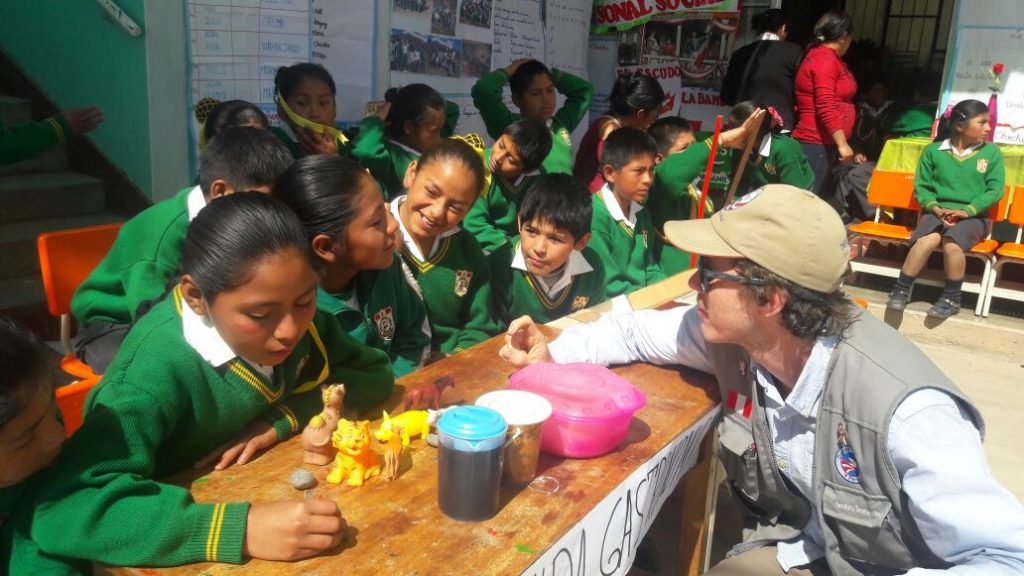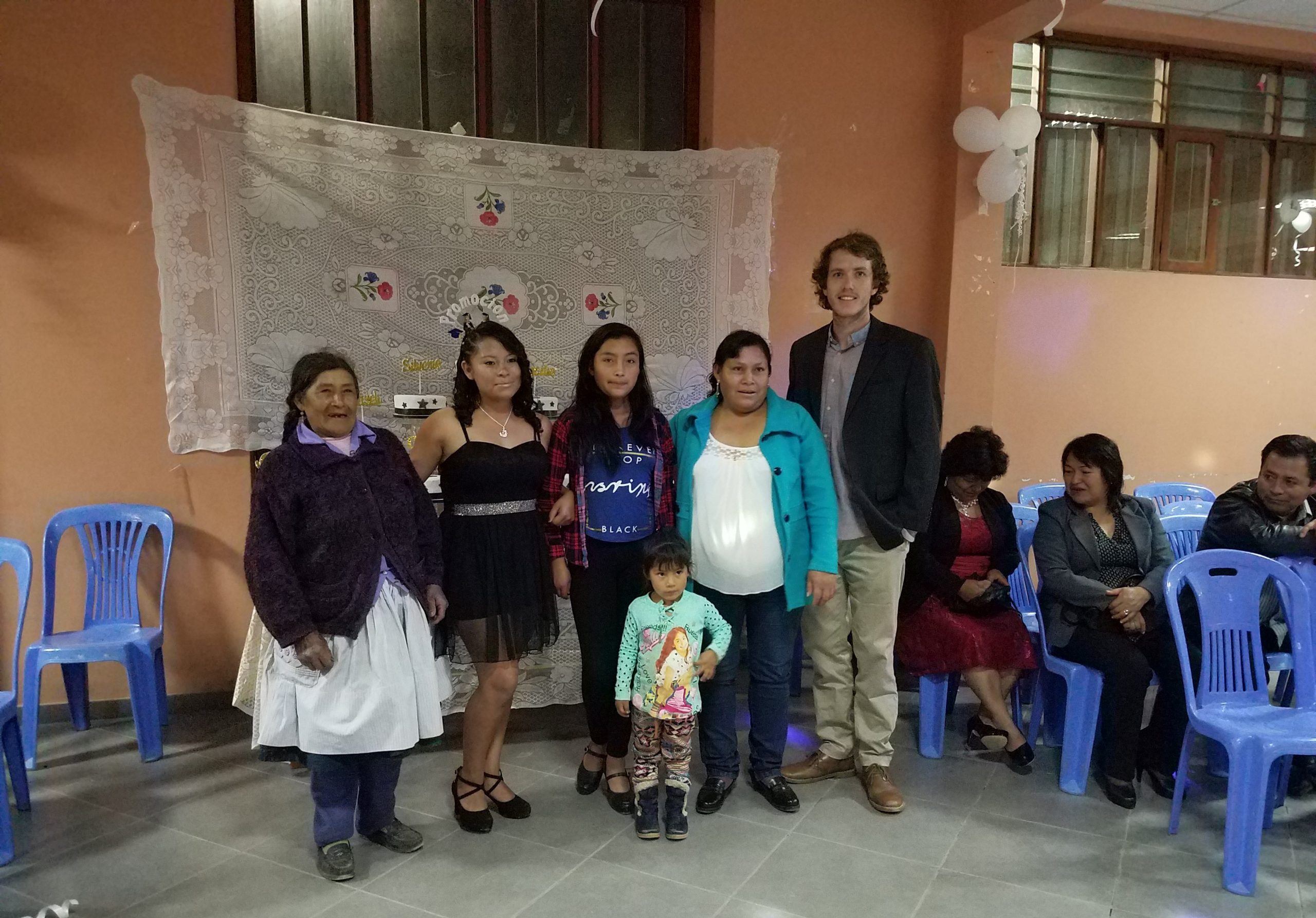Stevenson Center for Community and Economic Development graduate students have assisted communities all over the globe, through Peace Corps, AmeriCorps, and other organizations. But direct service is not their only contribution: their research can have a significant impact as well.
In November 2019, an article by Teddy Dondanville, M.S. ’18, appeared in the academic journal Environmental Sociology. The article, “Porousness and Peru’s moratorium on genetically modified organisms: stakeholder epistemologies and neoliberal science,” was based on Dondanville’s capstone research project for his master’s degree in sociology. His co-author was actually another Stevenson Center alum: Dr. Michael Dougherty, M.A. ’03, Illinois State University associate professor of sociology. Dougherty earned a master’s degree in political science at Illinois State 15 years prior to Dondanville.
Both Dougherty and Dondanville were part of the now-retired Peace Corps Master’s International program that allowed graduate students to combine their studies with Peace Corps service. Students spent one calendar year on campus taking classes in their discipline and in applied community and economic development prior to departing for Peace Corps for their professional practice.
Dougherty worked on municipal projects in Guatemala from 2002 to 2004 and then went on to earn a Ph.D. in development studies at the University of Wisconsin-Madison. Dondanville was a youth development facilitator in Peru from 2017 to 2019. Peace Corps announced the end of the Master’s International program nationwide in 2016 just after Dondanville was admitted, and so he was among the last of the Master’s International students to graduate from Illinois State.
Dondanville’s capstone research related to his Peace Corps service in Peru: “My project investigated the Peruvian moratorium on genetically modified-organisms (GMOs). The moratorium was a law created in 2011 to protect Peruvian farmers, agriculture, and wild biodiversity from the negative impacts inflicted by GMOs. Essentially, it attempted to make the usage and trade of GMOs illegal in Peru.”
When he arrived on campus in August 2016, Dondanville was drawn to food structures as a research topic because he found “that agricultural systems serve as an important intersection of human populations and the natural environment.”
“I first investigated the Peruvian GMO moratorium while crafting an essay for my political ecology course with Dr. Matt Himley from the (Geography, Geology, and the Environment) Department. I used the information I gathered during that research process to form the foundation for the research I eventually completed in Peru.”
One hurdle described by Dondanville was planning his capstone research project: “Essentially I had to create a research question that was broad enough to include the work I completed prior to arriving in Peru, while also being able to make it more specific after getting to Peru and finding out exactly what would be logistically possible.”
The process continued into Dondanville’s Peace Corps service: “First, I created a historical analysis of the GMO moratorium in Peru. I traced the development of the law, its explicit motivations and implicit underpinnings. Second, I offered a contemporary analysis of the knowledge systems, or ways of understanding, surrounding GMOs and farming practices utilized in the community I was living in. Then, I carried out interviews with Peruvian farmers, academics, and agricultural- and indigenous-rights activists. I also employed an encompassing discourse analysis of important official documents and legislation. Lastly, I gathered data from my own observations while living in a rural farming community.”

Teddy Dondanville and his students enjoy El Día de Logro (Achievement Day), a day where students present some of the new information they’ve learned throughout the school year.
The Master’s International program required students to fill two challenging and rewarding roles simultaneously, Peace Corps Volunteer and graduate student.
Dondanville said: “Cultural integration, performing the role of researcher and gaining trust from the community was difficult. Working and being successful as a Peace Corps volunteer is incredibly dependent on successful cultural integration. Until trust is gained and the community sees the volunteer to be genuinely invested in them, little volunteer work can be done. This much is also true for performing research. I found out that farming is personal. It’s a lifestyle, a deeply ancestral way of being. It’s emotionally driven and crucially important. Being able to participate in that, ask about it, and observe it takes time and delicate, trust-building efforts.”

Teddy Dondanville presents certificates to students who participated in the rock climbing workshop he organized with his counterparts for El Día de Logro (Achievement Day).
One benefit of navigating those complexities is the contribution Dondanville’s research will make to the ongoing academic and policy debates regarding GMOs. When asked about the impact of his project, Dondanville said, “I think the information is useful for academics interested in Peruvian agriculture and South American agriculture more generally. I think it will be utilized for its concise tracking and synopsis of the Peruvian GMO moratorium. I also think it will be used to extend and add specific detail to the conversation about the complexities of legislation surrounding GMOs in the South American context, especially in circles interested in the sociology of science and technology, environmental sociology, and political ecology.”
While the Master’s International program has ended, the Stevenson Center continues to offer applied, interdisciplinary graduate programs in community and economic development. The programs are open to those who have at least one year of full-time experience in community development or social services, whether through employment or programs like AmeriCorps and Peace Corps.
Dondanville said: “My course work at ISU honed my writing, reading, and analytical skills (amongst other things), while my work as a volunteer gave me the context and confidence to work in community development situations. … I really enjoyed the interdisciplinary aspect of my education. I thought that receiving an education from various disciplines really enhanced my on-campus experience, as well as my capabilities as a Peace Corps Volunteer and field researcher. ”
The Stevenson Center also manages the Peace Corps Prep program for undergraduate students interested in Peace Corps service or careers in the public sector.
Shaylin Quaid is the Stevenson Center’s public relations intern.

